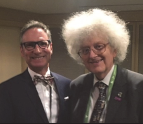This is reprinted from the fall 2017 issue of ACCN, The Canadian Chemical News. We thought readers would be interested in hearing what Michael Jansen, a high school teacher and regular Chem 13 News columnist, has to say to the Chemical Institute of Canada (CIC) — similar to the American Chemical Society and Royal Society of Chemistry. Love to hear your feed-back! Canadian high school science teachers have access to a free subscription of ACCN.]
College and university professors need to collaborate with high school teachers to better prepare students for post‐secondary education. First off, let me say how absolutely fabulous it was to receive the 2017 Beaumier Award for High School/CEGEP Chemistry Teachers. It is a huge honour that will stop me from slacking off any time soon.
To add more goodness, my spouse and I were invited (free tickets!) to the fancy 100th Canadian Chemistry Conference and Exhibition in Toronto, where we ate a nice dinner and had a glass of wine in the company of smart, friendly, well-dressed people. It was a head rush to have my photo taken with British chemist Sir Martyn Poliakoff (my students love him!) and to sit a bun’s throw away from Nobel Laureate John Polanyi. That my turn came on the 100th anniversary of the conference made things even
sweeter. I’ve worked hard in this business for over 30 years; it was a serious honour to receive such important recognition— even though, in spite of what my spouse might say —I’m not so narcissistic and insecure that I measure my success by trophies or plaques or cheques for $1,000.
I have had the pleasure of attending and presenting at numerous CIC conferences. I have been welcomed graciously, and very few people have fallen asleep during my talks, I have been given useful suggestions and
comments and made wonderful contacts. That’s a good thing.
But here’s a not-so-good thing: on just about every occasion, I was the only high school teacher in the room. High school chemistry teachers have ways of getting together — the Science Teachers’ Association of Ontario
as an example — but it would crank things up a notch if we could conference (yes, that’s a verb) with college and university professors. The serious chemistry geeks — that’s a compliment — could answer our questions; they could tell us the most important things for our graduating students to know; we could put them on speed-dial.
The slogan on the CIC website is “For Our Future.” This is a great slogan. Why not milk it? I propose that the CIC offer free conference registration for high school teachers (the Canadian Society for Chemistry annual conference currently offers reduced registration fees for teachers). I also propose that a professor and a high school teacher curate and chair a day-long session catered to teachers. (I thank Andrew Dicks of the University of Toronto for this idea. See what happens when you have a drink together?) First off, the timing of the conference, at the beginning of June, could be good. The school year is winding down, but teachers are still “in the zone.”
Presentations could include topic-based explanations and laboratory ideas specific to first-year chemistry. I don’t suggest that university professors have us give our students university-level work or university-level explanations but give us a solid understanding of what it is we’re supposed to teach.
Face it — many high school chemistry teachers do not have a specialization in the discipline. They could benefit from clear, big-picture explanations ranging from balancing redox equations to buffers. High school teachers need gurus and the university types can fill this need. Let me be clear: What we don’t need are more sessions on “flipped classrooms” or “clickers” or the flavour-dujour in education. We’re teachers; we know how to explain stuff, but we need a rock-solid foundation. University professors are well positioned to address misconceptions. For example, I would like to see a comprehensive,
accessible explanation of entropy and free energy, focusing on the qualitative — not on the calculations.
We hear that this is a knowledge economy. When teachers know what they need to know — and they know it well — they can explain it without pushing students towards memorization or rote. This would really embrace
“For Our Future.”
Because if we don’t do our job, y’all won’t have a job.
 Michael Jansen, left and Sir Martyn Poliakoff at CIC 2017 dinner
Michael Jansen, left and Sir Martyn Poliakoff at CIC 2017 dinner






